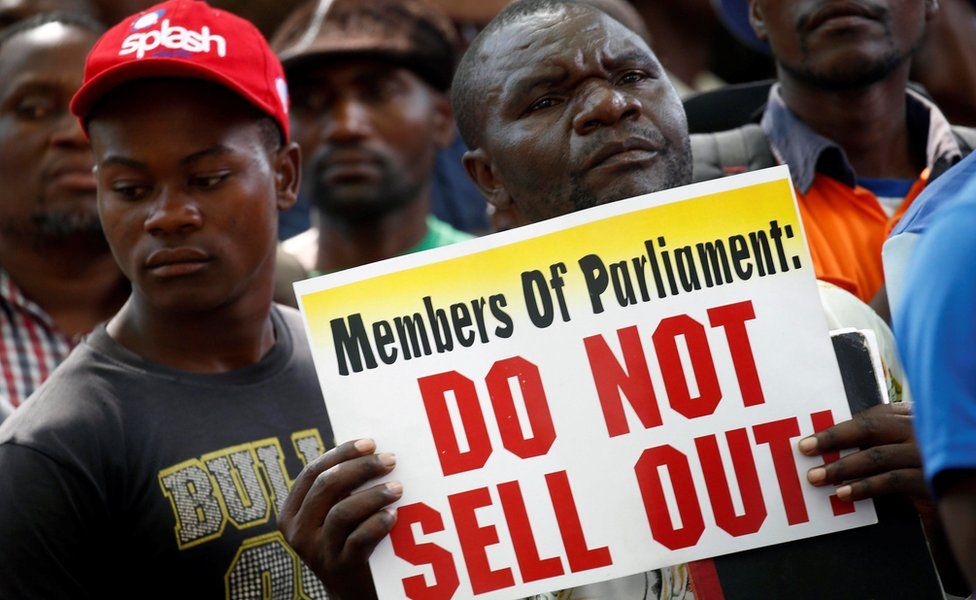Mugabe impeachment: Zimbabwe MPs debate motion against president
- Published

The Zimbabwean parliament has started impeachment proceedings against President Robert Mugabe.
Mr Mugabe, who has been in power since independence in 1980, is accused of allowing his wife to "usurp constitutional power" by trying to position her as his successor.
The motion to remove him is supported by Mr Mugabe's own Zanu-PF party.
Mr Mugabe has refused to resign despite last week's military takeover, and days of protests against his rule.
The motion for impeachment was moved and seconded at parliament, but lawmakers from both houses have adjourned to a hotel conference centre to debate it in a joint session.
Parliament speaker Jacob Mubenda said the motion was "unprecedented in the history of post-independence Zimbabwe".
Lawmakers have been taking turns to give their views on the motion, to many cheers, BBC Africa editor Fergal Keane reports.
Allow Twitter content?
This article contains content provided by Twitter. We ask for your permission before anything is loaded, as they may be using cookies and other technologies. You may want to read Twitter’s cookie policy, external and privacy policy, external before accepting. To view this content choose ‘accept and continue’.
There have been rallies and prayer meetings outside the parliament building in support of the move to impeach Mr Mugabe, who is 93.
The process is complicated and could take days, or even weeks.
Earlier on Tuesday, Zimbabwe's former vice-president, whose sacking led to last week's army takeover, urged Mr Mugabe to resign immediately.
Emmerson Mnangagwa said he had fled abroad two weeks ago when he learned of a plot to kill him, and he would not return until he was sure of his security.
Speaking from an undisclosed location, he said the president should heed the "clarion call" of his people and step down.
In a bid to resolve the crisis, South African President Jacob Zuma and his Angolan counterpart João Lourenço will travel to Zimbabwe on Wednesday on behalf of southern Africa's regional body, Sadc, the grouping said.
How does the impeachment process work?
If the motion is approved as expected by a 50% majority in the joint sitting of the National Assembly and the Senate, a committee from both chambers will be appointed to investigate.
Should the committee support the charges, the president can then be removed if both houses back them with two-thirds majorities.
Zanu-PF MP Paul Mangwana said the process could be fast-tracked and completed by Wednesday, "because the charges are so clear". But others insist the process should take longer.
Tendai Biti, a leader of the opposition MDC, insists the constitution allows for a fair hearing. "Mugabe as the accused person will obviously be entitled to legal representation," Mr Biti told the BBC.
The full process, he added, could take between one and three weeks. If the impeachment is fast-tracked, he said, "the process will not be legitimate or credible".
Zimbabwe's week of upheaval in two minutes
- Published20 November 2017
- Published21 November 2017
- Published3 August 2018
- Published25 July 2018
- Published21 November 2017